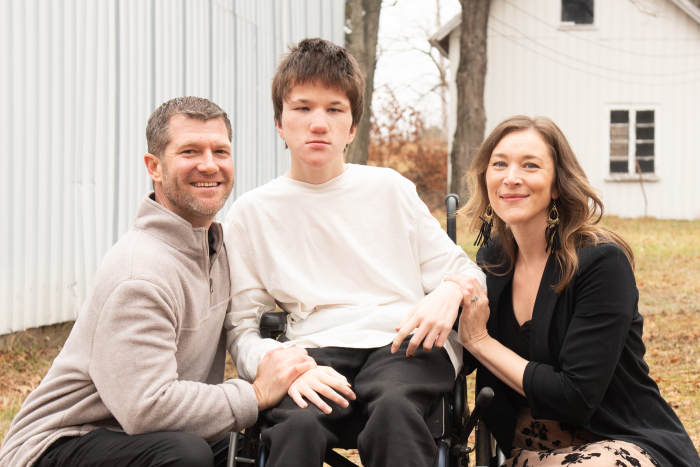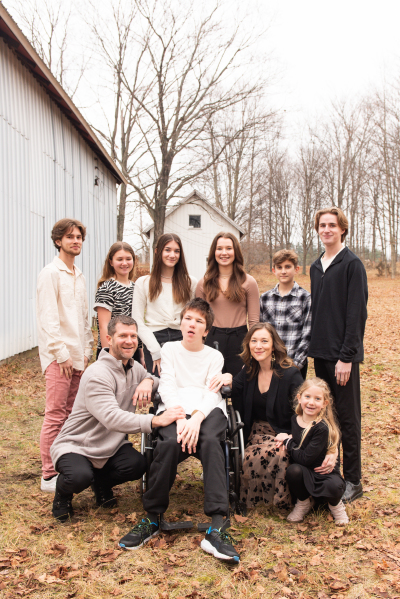
Jessica Ronne’s journey as a caregiver started on a day that would have shattered her world.
In 2004, throughout a routine ultrasound appointment for her second youngster, medical doctors knowledgeable her that her unborn son had skilled a stroke in utero. They supplied no hope, suggesting she terminate the being pregnant and “try again.” However Ronne and her husband refused.
“We put our baby in the Lord’s hands and just had faith that God’s will would be done,” she recalled.
When Lucas was born on Aug. 12, 2004, “screaming with life,’” Ronne turned what she termed “a forever caregiver.” Lucas’ profound disabilities would require lifelong care. However on the time, she was merely grateful for her miracle child.
“It wasn’t even something I really focused on,” she mentioned.
Just a few years later, her world shifted once more when her husband was recognized with a terminal mind tumor. For 3 years, they fought the most cancers whereas elevating 4 younger youngsters, together with Lucas. By 2010, Jess, then 33, was a widow elevating 4 youngsters youthful than 7.
But, it was on this crucible of grief and duty that Ronne found an unshakable resilience.
“My kids got me out of bed every day. I had to keep living for them,” she mentioned. “Even as I buried my husband, I promised him that our children wouldn’t lose two parents — one to death and one to depressive grief.” Anchored by religion, she discovered the power to take every step ahead.
“I just leaned into the Lord, and he provided what I needed, which was just enough manna for the moment, and I was just able to continue to put one foot in front of the other and continue to live for my children,” she mentioned.
At the moment, Ronne is a robust advocate for father or mother caregivers, a demographic she mentioned stays largely invisible to society. Years after her husband’s passing, Ronne met Ryan, a father of three who’d additionally misplaced his partner to most cancers. The 2 married in 2015, they usually later welcomed a daughter, bringing their blended household to 10.
Because the founder and govt director of The Lucas Mission, she works to offer recognition, sources and respite for households like hers.
“I do believe there are a lot of good people in the world who are willing to help if they know what the needs are. But … with these profound disabilities comes nonverbal, comes screaming, comes behavioral issues, comes incontinence, all things my 20-year-old son has. And so, the world just isn’t made for families like ours,” she mentioned.
“We isolate ourselves in our homes with these behaviors, with the aggression, with the incontinence. I often even speak with pastors at churches, and they’re like, ‘We don’t have these families in our community.’ And I’ll say, ‘Yes, you do, you just don’t see them.’ The church is not created for these families. Environments aren’t created for these families.”

Via The Lucas Mission, the Michigan native has developed care packages, useful resource databases, and help teams. She additionally speaks nationally in regards to the realities of caregiving and produces movies like “Unseen: How We’re Failing Parent Caregivers,” a documentary that sheds gentle on the isolation and psychological well being struggles these households face.
“We have a tsunami of children with special needs aging into adulthood,” she mentioned. “If we don’t step in with resources, it will be detrimental to society.”
In keeping with Ronne, the Church has a pivotal function in addressing these wants, however many congregations draw back resulting from worry of the unknown.
“Each child is so different, and the Church doesn’t know its place,” she mentioned. “But helping doesn’t have to mean direct care for the child. It can be mowing a family’s lawn, bringing over a meal, or picking up groceries. Small groups within a church could adopt a family, learning together how to meet their needs.”
She urged congregations to step out of their consolation zones: “This is exactly the kind of work Jesus did — stepping into messy, uncomfortable spaces,” she mentioned.
Ronne inspired different caregivers to see their work as “holy,” although acknowledging it may be overwhelming. She recounted a second of frustration, overwhelmed by her son’s wants whereas managing the manufacturing of the documentary.
“I felt like Jesus said to me, ‘This is holy work. I would be right here with you doing this.’ It reframed everything. Caring for another individual is the holiest work we can do this side of eternity,” she mentioned.
That perspective is central to her newest e book,Caregiving with Grit and Grace.“It’s about viewing caregiving in light of eternity,” she says. “We might not see our reward this side of Heaven, but we’re living for that ‘Well done, good and faithful servant.’”
In February, Luke moved into a gaggle house, a choice Ronne as soon as thought she’d by no means make. “When Lucas was little, I couldn’t imagine him living anywhere but with me,” she mentioned. “But as he grew, his needs became more complex. It’s been a transition for all of us, but he’s thriving. He’s gained so many skills and is living his best life.”
The transfer has additionally introduced newfound peace to Ronne and her household. “For years, weekends were overwhelming. Now they’re relaxing. My husband and I can take a nap if we want to,” she mentioned. “My work had revolved around being Lucas’ caregiver for 20 years. It’s a period of transition, but also one of rest.”
As Nationwide Caregivers Month brings consideration to the 16.3 million caregivers within the U.S., Ronne urged society to take inventory of how they will help households with particular wants youngsters.
“I think a lot of caregivers kind of have the smarter mentality, like, ‘Nobody can do it like me. I’ll be fine,’” she mentioned.” We’re not fantastic. We’re exhausted. Let folks bless you by entering into your circumstances and offering a meal or offering some respite so that you could go take a nap, you’ll be able to go for a stroll, or simply do one thing to rejuvenate your self. Jesus desires that for us too. He desires us to be our greatest variations for those that we take care of.”
In a world the place caregivers are sometimes unseen, Ronne mentioned she desires to verify their tales — and their struggles — are lastly acknowledged. For caregivers themselves, she supplied encouragement: “I hope that caregivers feel permission to feel anger, joy, pain,” she mentioned.
“It’s such a juxtaposition when you’re a caregiver, because there can be such joyful moments, but there are such painful moments too. It’s learning to live in that tension of the joy and the pain. The holiness of the acts that we do day by day by day is the glue that binds all of that together.”
Leah M. Klett is a reporter for The Christian Publish. She will be reached at: leah.klett@christianpost.com
“Well bless their hearts.”













